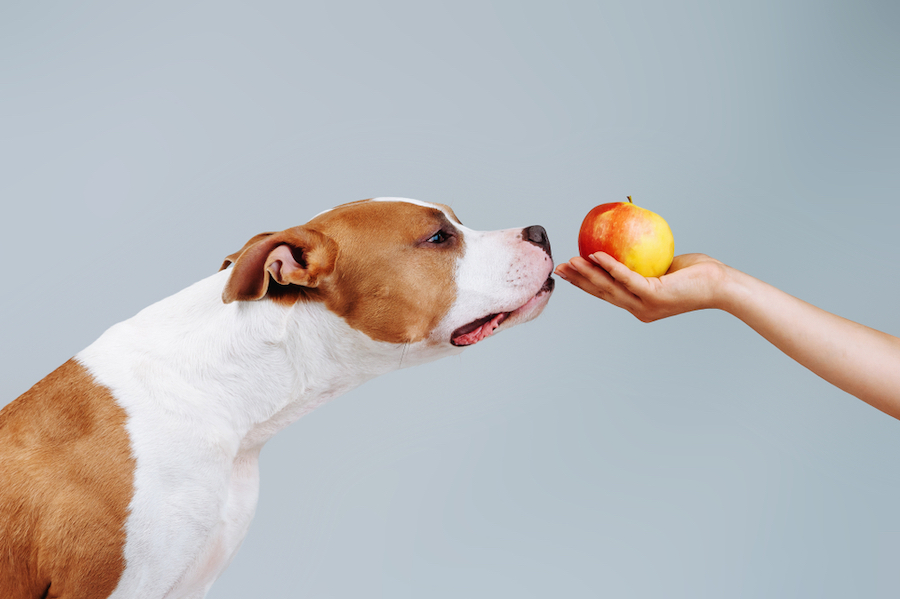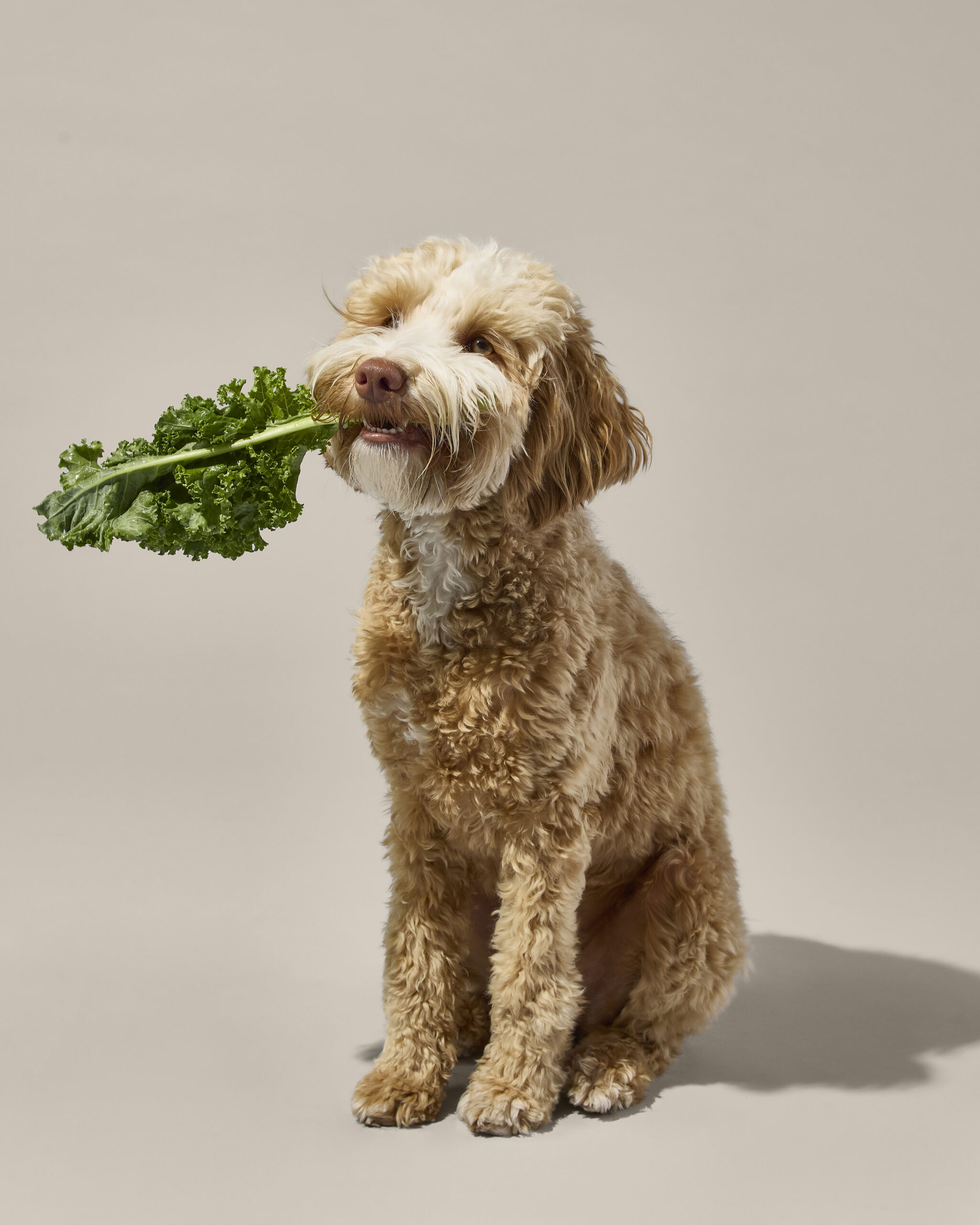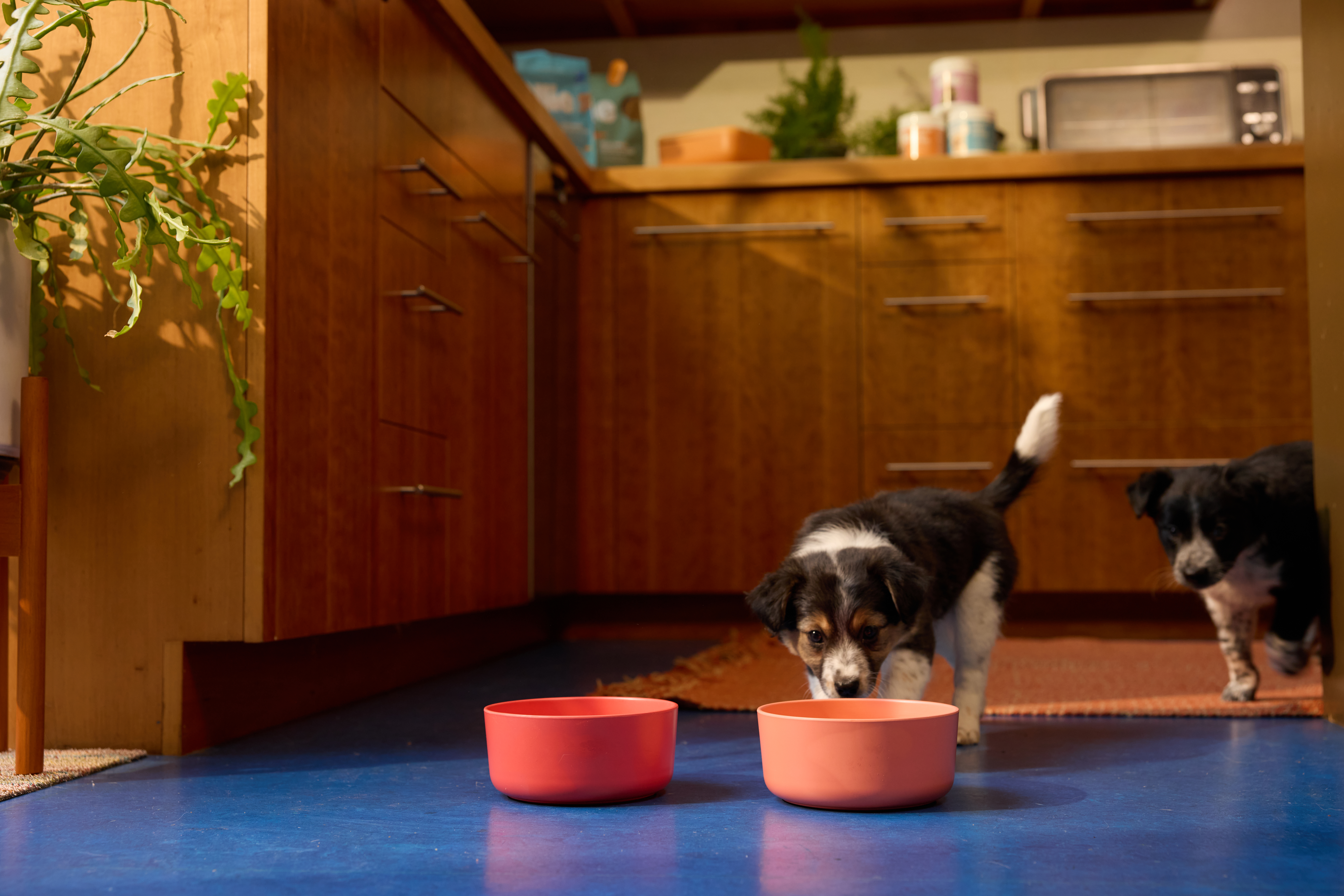Hey Ollie blog readers! We’re offering you an exclusive 60% OFF your starter box! Try now!
While an apple a day may keep the doctor away from us, is the same true for our dogs? If you’ve ever thought about sharing an apple with your (four-legged) best friend, this post will tell you everything you need to know first.
Can Dogs Eat Apples?
Yes, dogs can eat apples! Apples are a nutritious and tasty treat that many dogs enjoy. They are naturally sweet, low in calories, and packed with essential vitamins and minerals. Whether you’re looking for a crunchy snack or a healthy addition to your dog’s diet, apples can be a great choice when served correctly.
Apples are rich in vitamin C, vitamin A, fiber, and antioxidants, all of which contribute to your dog’s overall health. Vitamin A supports eye health and immune function, while vitamin C helps with tissue repair and a strong immune system. The fiber in apples aids digestion, promoting a healthy gut. Additionally, apples contain natural antioxidants that help combat free radicals and support long-term health.
However, while apples are safe for dogs, they should always be prepared properly before serving. The core and seeds must be removed, as apple seeds contain trace amounts of cyanide, which can be harmful in large quantities. It’s also important to serve apples in moderation, as too much fruit can lead to digestive upset due to their natural sugar content.
If you’re introducing apples to your dog’s diet for the first time, start with a small piece and monitor for any adverse reactions. Most dogs love the sweet taste and crunchy texture, making apples an easy and enjoyable snack option!
Are Apples Safe for Dogs?
Yes, apples are safe for dogs when prepared and served correctly. They provide numerous health benefits, but there are a few things to consider to ensure they’re a safe treat for your pup.
The most important safety concern is the apple core and seeds. Apple seeds contain a small amount of cyanogenic glycosides, which can release cyanide when chewed or digested. While a few seeds are unlikely to cause harm, regularly consuming them in large amounts could pose a risk. The core can also be a choking hazard, especially for smaller dogs. To keep your dog safe, always remove the core and seeds before feeding apples.
Another factor to consider is portion size. While apples are healthy, they do contain natural sugars, which can lead to weight gain or digestive issues if eaten in excess. Dogs with diabetes or sensitive stomachs should have apples in limited amounts, and it’s best to check with a veterinarian if you have concerns about introducing fruit into your dog’s diet.
Additionally, avoid giving your dog apple-flavored products or apples with added sugars, artificial sweeteners, or spices. Some store-bought apple snacks contain harmful ingredients like xylitol, which is toxic to dogs. Always opt for fresh, plain apples to ensure your pup is getting the safest and healthiest version of this fruit.
When prepared correctly, apples are a safe, delicious, and beneficial treat that can be a regular part of your dog’s diet. Whether sliced, pureed, or frozen for a refreshing snack, apples are a great way to add variety to your pup’s treats while keeping them healthy and happy!
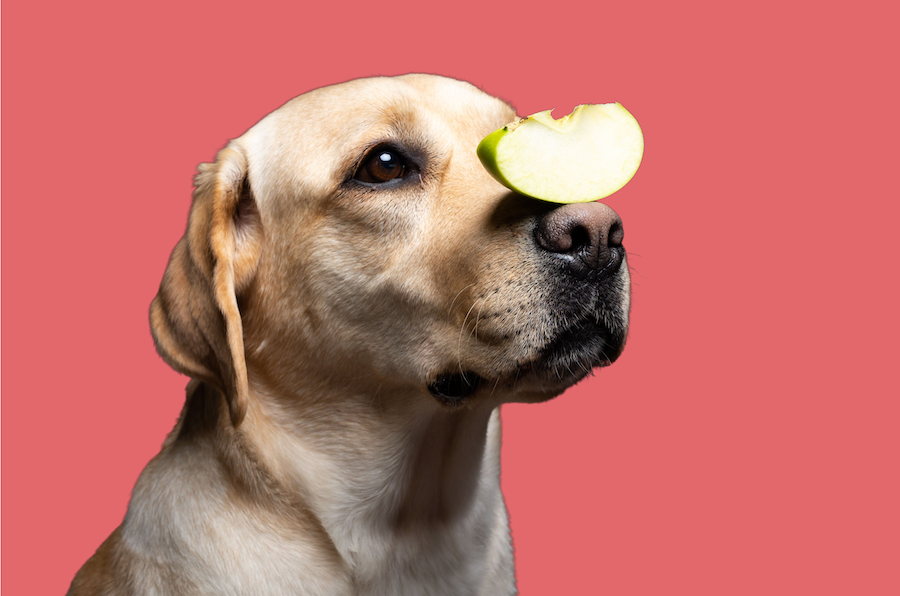
Are apples good for dogs?
Apples are a suitable snack for most dogs. They’re high in vitamins A and C as well as fiber that can help pups feel full, and their sweet, satisfying crunch can be just as appealing for your pup as it is for you.
While apples can be a great snack, remember to feed them in moderation. They do contain natural sugar, so you don’t want to allow your pup to have too much. If you and your pup are being particularly active and taking long walks or hiking, an apple might be the perfect treat for an energy boost, so go ahead and share an apple to refuel!
Health Benefits of Apples for Dogs
Apples are more than just a tasty treat—they offer a variety of health benefits for dogs. Packed with essential vitamins, fiber, and antioxidants, apples can be a great addition to your pup’s diet when served in moderation.
1. Rich in Essential Vitamins
Apples are an excellent source of vitamin A and vitamin C, which support overall health.
- Vitamin A promotes good vision, a healthy immune system, and proper skin and coat health.
- Vitamin C supports immune function, helps with tissue repair, and can reduce inflammation.
2. High in Fiber for Digestive Health
Apples contain both soluble and insoluble fiber, which can aid digestion and promote a healthy gut.
- Soluble fiber helps regulate blood sugar levels and improves nutrient absorption.
- Insoluble fiber supports regular bowel movements and prevents constipation.
3. Supports Dental Health
The crunchy texture of apples can help clean your dog’s teeth by scraping away plaque and tartar buildup as they chew. While apples are not a substitute for brushing your dog’s teeth, they can contribute to better oral hygiene.
4. A Low-Calorie, Hydrating Snack
Apples are low in fat and calories, making them a great treat option for dogs who need to maintain a healthy weight. They are also about 86% water, helping to keep your dog hydrated while providing a refreshing snack.
5. Antioxidant Properties for Long-Term Health
Apples contain antioxidants such as quercetin and polyphenols, which help fight oxidative stress and reduce the risk of chronic diseases. These compounds support brain health, heart health, and overall longevity in dogs.
Because apples offer so many nutritional benefits, they are a great addition to a balanced diet. However, always serve them in moderation and remove the seeds and core to keep your pup safe. Whether fresh, frozen, or blended into homemade treats, apples make a nutritious and delicious snack for your furry friend!
What Parts of an Apple Can Dogs Safely Eat?
Like many fruits, the entire apple is not safe for pups. Your dog can enjoy the skin and flesh of an apple. But you want to avoid feeding them the seeds and the core. This is for two reasons. The first is that apple seeds do contain small amounts of cyanide (a toxin), so they shouldn’t be ingested. Second, the seeds and core can be a choking hazard.
While apples are a healthy and tasty treat for dogs, not every part of the apple is safe to eat. Dogs can enjoy the skin and flesh, but other parts of the apple, such as the seeds, core, and leaves, should be avoided due to potential health risks. Understanding which parts are safe and which should be removed will help you serve apples to your dog safely.
Can Dogs Eat Apple Skin?
Yes! The skin of an apple is safe for dogs to eat and contains a high concentration of fiber, antioxidants, and beneficial plant compounds. Apple skin can help support digestion, regulate blood sugar, and contribute to a shiny, healthy coat. However, if your dog has a sensitive stomach, peeling the apple may help prevent digestive upset. Also, if the apple is not organic, washing it thoroughly can help remove pesticide residues.
Can Dogs Eat Apple Flesh?
Yes! The flesh of an apple is the safest and most nutritious part for dogs. It is rich in vitamins A and C, low in calories, and high in moisture, making it a refreshing and hydrating treat. The natural sweetness makes apples a favorite snack for many dogs, but moderation is key to avoiding excess sugar intake.
Can Dogs Eat Apple Core?
No, dogs should not eat the apple core. The core is tough and difficult to chew, making it a choking hazard, especially for small dogs. It can also cause intestinal blockages if swallowed whole. Always remove the core before serving apples to your pup.
Can Dogs Eat Apple Seeds?
No, apple seeds are unsafe for dogs. They contain amygdalin, a compound that releases cyanide when digested. While a few seeds are unlikely to cause harm, repeated exposure to large quantities could be toxic. To keep your pup safe, always remove seeds before offering apples.
Can Dogs Eat Apple Leaves?
No, apple leaves are not recommended for dogs. While not as toxic as the seeds, apple leaves contain trace amounts of compounds that can cause mild stomach upset. If your dog happens to nibble on a leaf, they will likely be fine, but it’s best to avoid offering them intentionally.
How often can my dog eat apples?
The answer to this question depends on your dog’s size and health. For pups who are diabetic, make sure to chat with your vet before sharing any apples with them. For generally healthy dogs, you should introduce apples slowly (as you would with any new food or treat) to ensure your dog both tolerates and enjoys them.
Offering a small piece daily or a few times a week should not cause any issues as long as it fits into your pup’s overall diet. Too many calories (even from healthy foods like apples) can lead to weight gain.
One other source of apples you should avoid sharing with your dog is apple pie filling. Both jarred and canned varieties, as well as homemade dessert fillings, can contain too much sugar as well as spices that aren’t good for your dog. If you want to offer a treat made with apples, consider choosing a dog-friendly recipe that contains some apples for sweetness. These apple treats made with greek yogurt, oats, and ginger are a great example. Or, if you’re looking for a way for your pup to beat the heat and add some healthy hydration, you can make these carrot apple popsicles:
Carrot Apple Popsicle Recipe
Ingredients:
3-4 Carrots peeled and chopped
1 large apple peeled and chopped (discard the skin, core, and seeds)
1/2 – 1 C. water as needed
Directions:
Combine the chopped apples and carrots and cover with water. Spoon the mixture into silicone molds or use it to fill a Kong or other freezer-safe enrichment toy. Allow the mixture to freeze overnight or until solid. Serve once frozen and store the remaining popsicles in the freezer and share with your pup as needed.
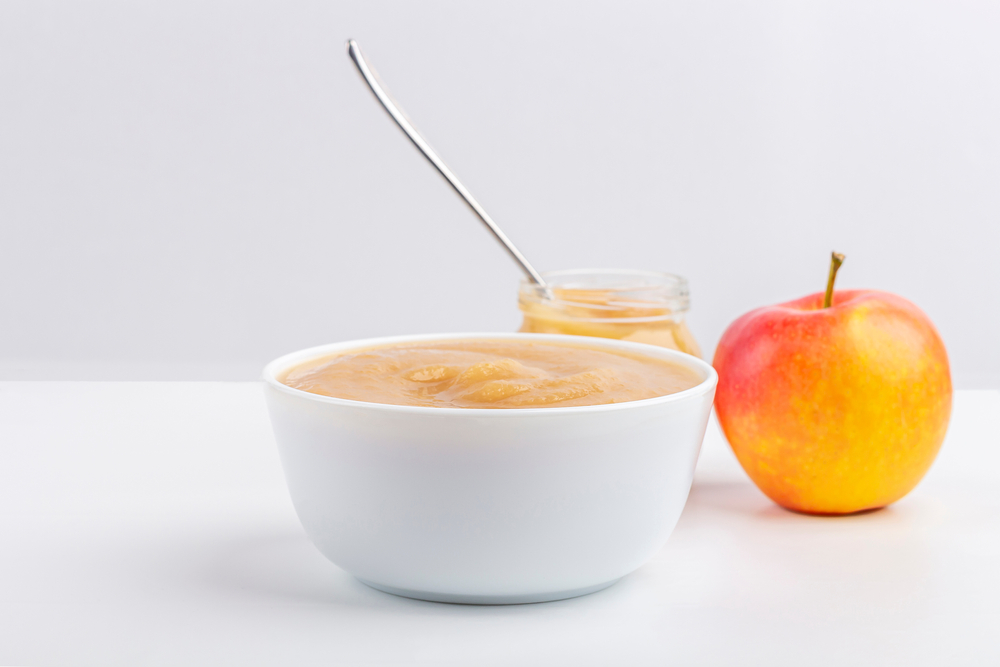
Can dogs eat applesauce?
They sure can! Dogs can have applesauce as long as it does not contain added sugars and spices like nutmeg (which can be toxic to dogs). If you want to share applesauce with your dog, the best way is to make it at home so you can control the ingredients. Just remember that by cooking down and concentrating the apples, you will end up with a sauce that has more sugar per spoonful than the corresponding amount of fresh, unprocessed apples, and you need to adjust your serving sizes accordingly.
Applesauce can be useful for hiding medication to make it more palatable for your pup. If you’re going to go that route, confirm with your vet that it is a suitable way to deliver medication.
Bottom line, if you’re looking for a sweet treat to share with your pup that is still on the healthy side, an apple might be the ideal choice. Grab a few slices or some homemade apple sauce, and allow your best friend to chow down. Remember to enjoy the enthusiastic crunches as your dog enjoys their tasty treat.
Tagged As:

The nutrition your dog needs,
the food they want.

Enjoying our articles? Subscribe our Newsletters and get new articles directly to your inbox
You might also like
4 August 2025
5 MINS READ
Key Ingredients in Fresh Dog Food Explained
The right food starts with the right ingredients. Unlike highly processed kibble, which can contain fillers and low-quality by-products, fresh food focuses on transparency and quality. At Ollie, w…
by Ollie Pets
4 August 2025
6 MINS READ
Fresh Dog Food Benefits for Growing Puppies
Proper nutrition as a puppy is the foundation for a long, healthy, and happy life. Fresh, human-grade meals can support your puppy’s rapid growth, brain development, and long-term health in ways…
by Ollie Pets
4 August 2025
6 MINS READ
Choosing Specialized Dog Food: Solutions for Allergies and Sensitivities
There’s nothing more difficult than seeing your dog uncomfortable. Constant scratching, upset stomachs, or chronic ear infections can be signs that something in their diet isn’t agreeing with …
by Ollie Pets
